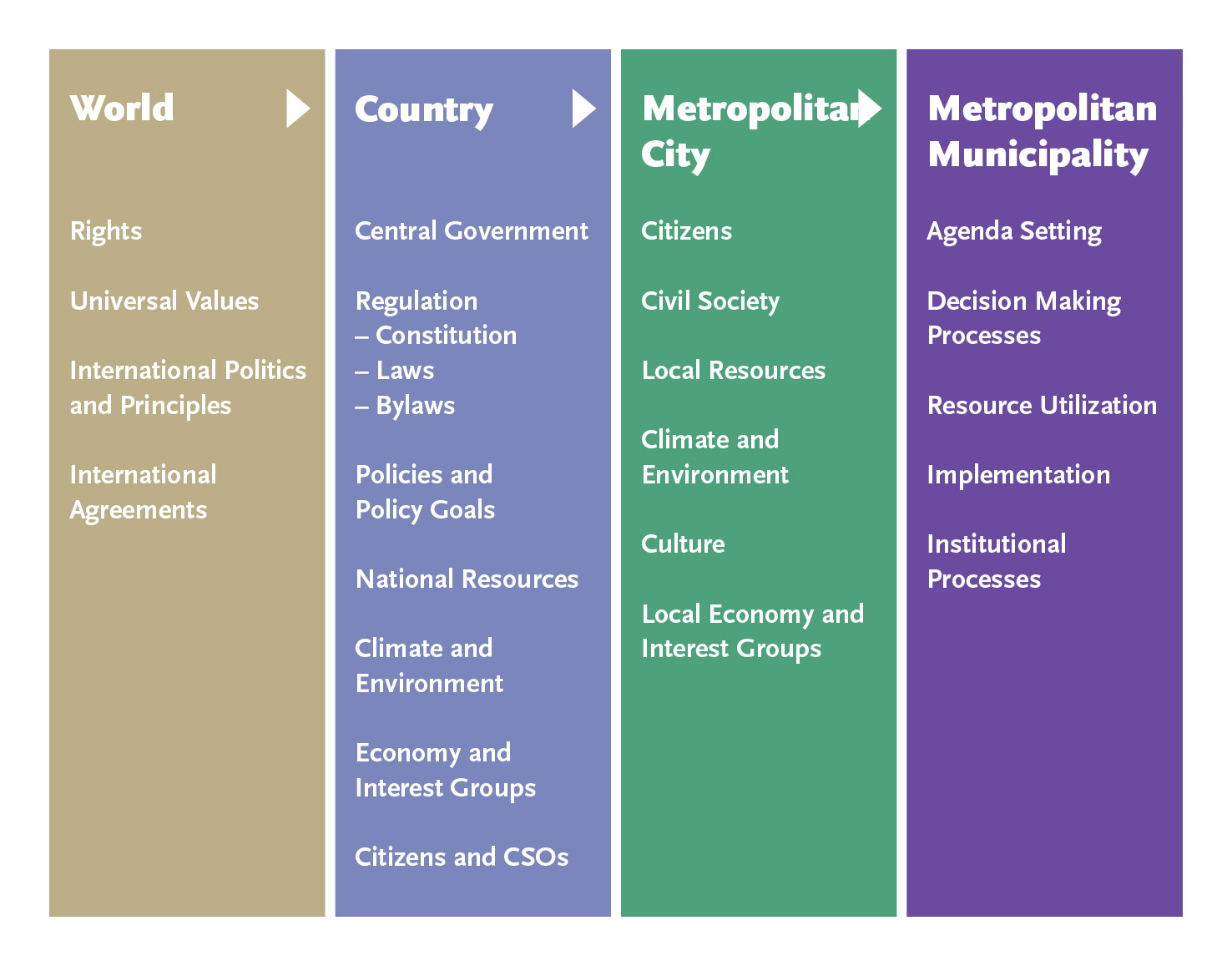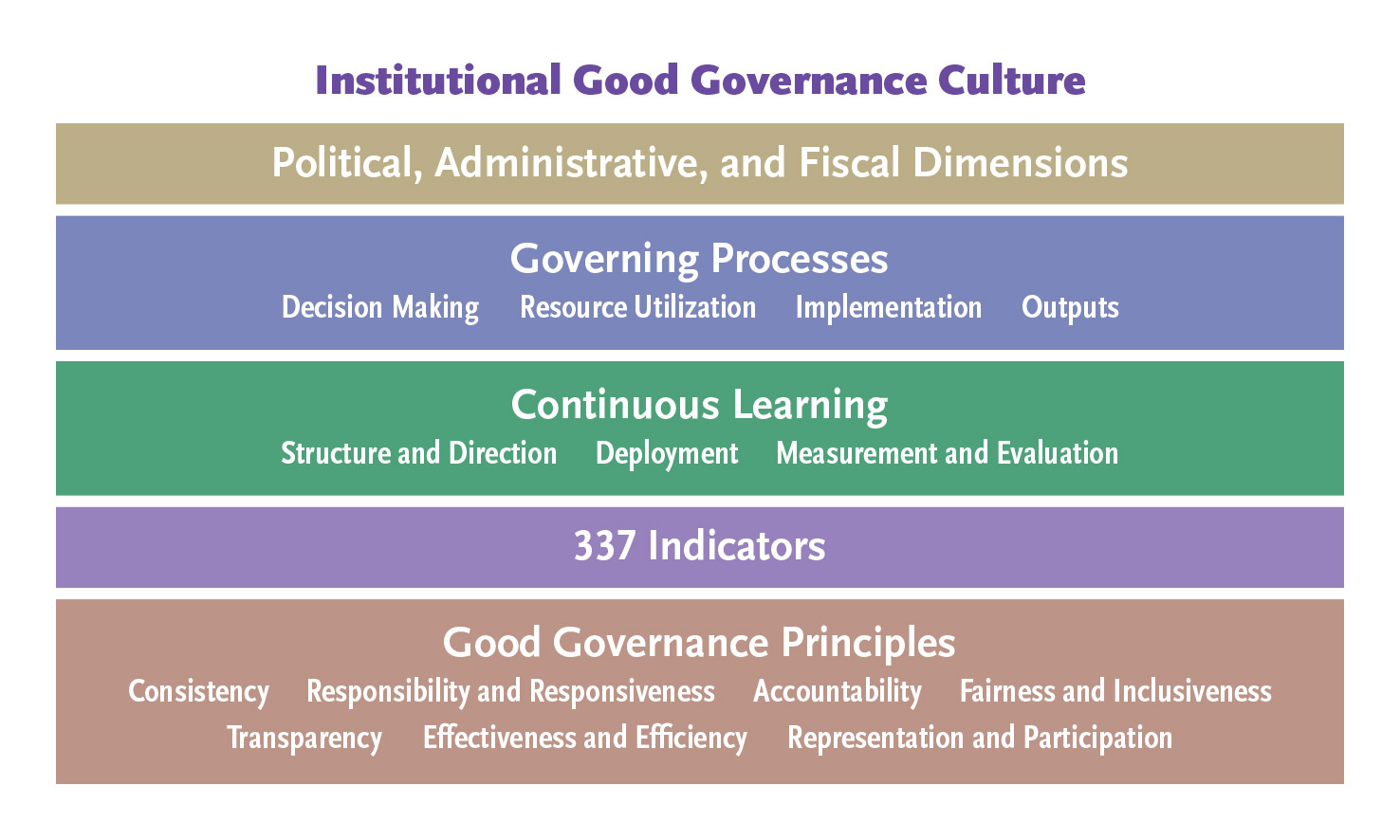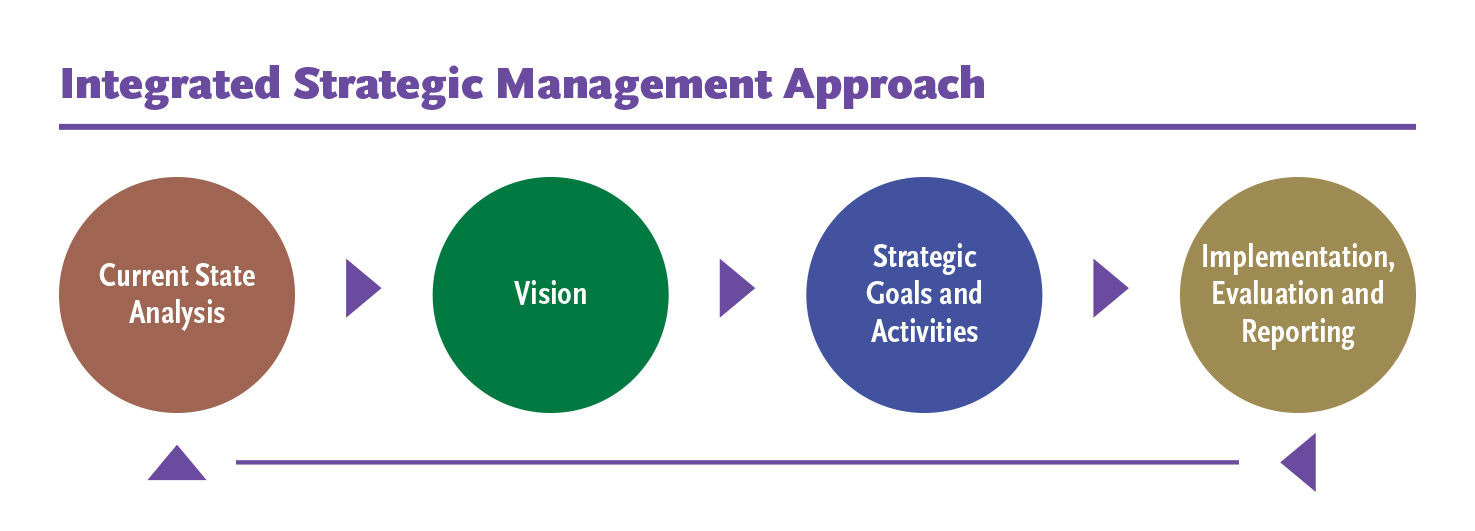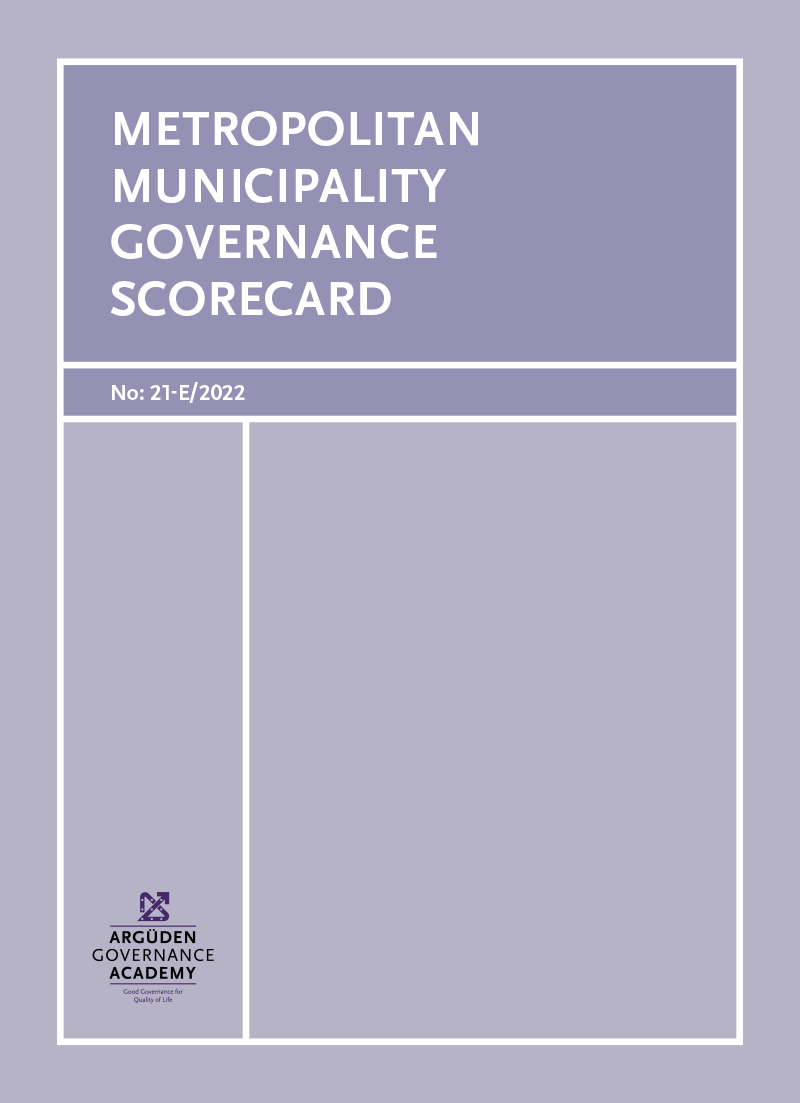Our Model
Argüden Governance Academy has developed the Metropolitan Municipality Governance Scorecard Model (MMGS) to measure and evaluate the quality of the implementation of good governance practices and support the continuous development and learning capability of metropolitan municipalities. The motives behind development, the development process, and content of the model will be explained in this section. It should be clarified that the model is neither a performance measurement tool for mayors and metropolitan municipalities nor is it a measurement tool for the satisfaction of citizens. The main aim of the model is to improve trust between citizens and metropolitan municipalities as well as support sustainable development and the municipalities’ efforts towards improving the quality of life based on good governance culture.
The model focuses on evaluating the implementation of good governance practices, goals, structures, decision making mechanisms for planning, resource utilization and systems for effective service delivery in metropolitan municipalities through a citizen’s perspective. One other goal of the model is to provide a tool for metropolitan municipalities, civil society organizations, and other stakeholders to bolster metropolitan municipalities in the improvement of good governance practices and culture in their organizations. The model is also a tool for the oversight of the right to the city by citizens. Trust in the municipalities could be improved by utilization of this model since it would allow the identification of areas of improvement by all stakeholders’ perspectives. The model aims at encouraging the cooperation and collaboration of civil society organizations, academia, and business with metropolitan municipalities in their efforts to improve sustainable development and quality of life in a region.
The model focuses on evaluating the implementation of good governance practices, goals, structures, decision making mechanisms for planning, resource utilization and systems for effective service delivery in metropolitan municipalities through a citizen’s perspective.
MMGS can be an innovative global model for evaluating the quality of governance practices of metropolitan municipalities all around the world. The model has been developed to be used worldwide by other metropolitan municipalities. Publicly available information provided by metropolitan municipalities is used to measure quality of good governance practices in those institutions. The model could be easily applicable by citizens. This model aims to understand the quality of the current governance culture and practices of metropolitan municipalities; then the model guides and encourages these institutions to improve their governance practices in required fields based on the evaluation of findings. The model has been tested in Türkiye in 27 metropolitan municipalities. The findings assert that the model is effective. For implementation in other jurisdictions, some refinements and adaptations may be required.
As it is shown in the diagram below, metropolitan cities must be considered from a global perspective. Metropolitan cities are affected by environmental, social, and economic challenges while they affect environmental, social, and economic issues as well. All these issues interact. These Interactions have been affected and shaped by local conditions, national governments, national institutions, economic and social actors, and multilateral institutions.

If these complex interactions are understood and analyzed, findings that will guide in the improvement of the quality of governance in metropolitan cities, could be very helpful for better managing risks and benefiting opportunities.
Characteristics of the Model
The quality of life could be improved through investments in environmental, social, economic, and other important physical infrastructures as well as designing and implementing sustainable development policies. Implementing inclusive policies could help deal with poverty and inequalities and build societal trust. From democratic, administrative, and fiscal perspectives, metropolitan municipalities are one the leading players of the city. Improving the quality of life and supporting sustainable consumption relate to the implementation of good governance culture and practices in metropolitan cities.
There are some tools for measuring the quality of governance in cities in the world (See: International Approaches). However, these tools do not necessarily measure governance quality based on governance principles and through a citizen perspective. The MMGS model has thus been developed to measure governance quality through organizational structuring, processes, and implementation of governance practices. The model cannot be used for measuring the overall performance of metropolitan municipalities. The quality of governance and performance of institutions are different concepts. Institutional performance can be measured based on achievements on predetermined goals by related stakeholders. Governance quality is one of the foundational stones of good performance through its ability to provide a guide on how to perform decision making and activities to be successful. The MMGS Model focuses on decision making processes, resource utilization approach, institutional capacity, and the implementation of decisions.

Governance is related to the quality of decision-making, resource utilization, institutional capacity, and implementation processes in a holistic and process-based manner. Trust by stakeholders is affected by governance quality. Conducting internal and external processes of participation, cooperation, and collaboration by municipalities improves the trust of stakeholders and supports effective and efficient resource utilization.
The structure and operational processes of metropolitan municipalities require a detailed analysis to measure and evaluate governance quality. Metropolitan municipalities are public institutions operating through political, administrative, and fiscal dimensions. Metropolitan municipal (political dimension) council members, for example, are elected. The municipal council makes fundamental decisions and ratifies plans. These decisions and plans are implemented through administrative processes. Resources are utilized to implement administrative processes by related departments by applying resources (such as financial resources, human resources, technology, and so on). Each department is responsible for an identified area of operations. Internal structures define the goals and direction of metropolitan municipalities. These goals and directions are reflected in strategic plans and performance programs. All departments perform activities in their area of responsibility in planning implementation. All investments, services, and projects constitute parts of the implementation of these plans. Implementations produce outputs. All outputs are evaluated by the institution and by all stakeholders. Institutional performance and fiscal performance are measured according to key performance indicators defined in strategic plans. Citizen satisfaction surveys are conducted to measure the perception of the stakeholders regarding the performance of the municipality. All the above processes could be considered under the decision-making – resource utilization – implementation – outputs loop. These four processes influence institutional capacity in addition to political system, economic and social conditions.
Integrated strategic planning and strategic management perspective are at the core of the model. Citizens consider strategic plans as overly technical documents. However, a strategic plan is prepared by making a detailed current state analysis (understanding the capabilities of the institution when starting the journey) and defining the vision (where the region will be at the end of the planning period) as well as a road map to reach identified goals. It is a holistic picture of today and the future. Metropolitan municipalities perform activities to reach identified goals in these plans and use the budget allocated in these plans to do so. Performance of the metropolitan municipality with respect to key performance indicators is later reported to stakeholders in a data-based manner.
The MMGS model is based on an intuitional, integrated, and analytic framework to measure the quality of governance in metropolitan municipalities. The indicators of the model have been determined by considering the following factors: political, administrative, and fiscal dimensions, and institutional and strategic planning processes.

The model targets an examination of these dimensions and processes in accordance with good governance principles, integrated governance, and citizen centric public governance perspectives. Based on this approach, we developed 337 indicators for 7 good governance principles, 4 institutional processes and 3 steps for institutional learning.
Seven good governance principles are:
- Consistency
- Responsibility and Responsiveness
- Accountability
- Fairness and Inclusiveness
- Transparency
- Effectiveness and Efficiency
- Participation and Representation
Four Institutional processes are:
- Agenda setting /Decision-making
- Resource utilization
- Implementation/Service provision
- Institutional functioning/capacity
Three steps of institutional learning are:
- Structure and direction
- Deployment
- Measurement and evaluation
The Model’s Focus Areas and Issues
Indicators reflect different policy and service areas. As such they can be categorized based on topics that are affected by good governance. Such a categorization can show us which policy development areas and service delivery processes will be improved by good governance. The table below summarizes how the goals and related indicators of MMGS are connected with certain policies and services.
- Development
- Health
- Environment
- Secure living
- Participation
- Social policy
- Housing
- Employment and Income
- Personal development and wellbeing
- Stakeholder engagement
- Alignment with SDGs
- Alignment to national, regional, and sectoral plans
- Children, women, disabled, etc. Disadvantages/fragile groups
- Activities for protection, support, strengthening and guidance
- Social policies
- Relations and engagement with civil society organizations and other stakeholders
- Environmental policies (Climate change, energy efficiency, protection of water resources, sea, land, forests, biodiversity, dealing with waste, etc.)
- Regional development
- Urban and rural development
- Investments to city
- Employment
- Tourism
- Protection of cultural heritage
- Participation areas
- Stakeholders
- Participation processes
- Participation tools and means
- Informing stakeholders before participation and giving feedback to stakeholders after participation
- Preparation of strategic plan
- Identification of services and activities
- Public meeting day
- Reaching out to mayor and municipal council members
- Digital tools (web site, mobile apps, etc.)
- City councils
- Civil Society Organizations
- Mukhtars (popularly elected heads of neighborhoods)
- Business and labor unions
- Academia and Research Institutes
- Transparent, accountable integrated governance
- Fiscal governance
- Evidence based governance
- Information regarding administrative processes
- Information regarding the city
- Financial information
- Performance related information
- Content of Strategic Plan, Annual Report, Performance Programs, and other documents
- Right to information
- Reporting complaints and demands and reporting these complaints and demands are handled
- Information and data sharing in comparative manner
- Financial information sharing in a consolidated manner (preparing consolidated financial including subsidiary organizations and subsidiary companies)
- Integrated governance
- Institutional learning
- Continuous development
- Sound financial management
- Integrated policy making process considering short, medium, and long-term
- Internal/external cooperation and coordination with stakeholders
- Alignment with central and regional policy documents and plans
- Coordination with districts
- Institutional development
- IT processes and technology
- Human resources
- Performance management
- Quality management systems
- R&D and innovation activities
- Resource development
- Monitoring and evaluation processes
The quality of life could be improved by implementing sustainable development and inclusive policies. Both implementing sustainable development and inclusive policies could be achieved by improving good governance practices in public institutions. Understanding risks and expectations, designing inclusive social policies could be achieved by collecting data, making evidence-based decisions, engaging with stakeholders in a continuous manner and efficiently utilizing resources. Metropolitan municipalities must utilize their authority and resources in an inclusive manner according to good governance culture. Early detection of environmental and social risks could be achieved by implementing an inclusive, participatory, and evidence-based decision-making approach. Such an approach would improve the quality of decisions made. If impact assessments regarding current and future impacts are conducted before decision-making, such an approach could help prevent future risks or help better manage those risks in the future and improve benefits. Such a decision would enable the consideration of needs, demands, and expectations of disadvantaged and fragile groups and also would help achieve effective and inclusive resource utilization. Collecting data for measuring the performance of activities, processes, and outputs of metropolitan municipalities would enable institutions to evaluate themselves in comparison with previous periods (years, quarter, months), other institutions, and KPIs. This evaluation perspective would help identify improvement areas which would lead to a cycle of continuous development. This sort of development would enable realizing the mission and vision of a metropolitan municipality, an outcome that could lead to sustainable regional development and improvement of quality of life in the region.
The MMGS model, developed by Argüden Governance Academy, aims to strengthen good governance practices in metropolitan municipalities to enable improvement in quality of life and sustainable development.
Approaches Used in the Development of the Model
Several approaches have been considered in the development of the model. Good governance principles guided the identification of approaches. The main aim is to enrich good governance culture and principles through the contribution of these approaches. These approaches are:
Citizen Centric Public Governance Approach
Democratic public governance puts experiences, problems, needs, and expectations of citizens to the center of governance processes. This approach aims to organize policies, plans and services based on democratic participation and representation. The main aim of the approach is to achieve equality and neutrality in the presentation of and attainment of provided services. Citizens are real owners of authority and resources; therefore, the model accepts that they have the right to monitor, evaluate, participate, and receive information. MMGS enables & supports citizens to exercise their right to the city and citizenship in metropolitan cities.
Integrated Thinking Approach
Integrated thinking defines the act of considering different parts and activities of the institution in a holistic manner.1 The holistic perspective focuses on the following issues not as separate topics or steps but as interdependent and connected parts of a whole:
- How value is created,
- What type of interaction exists between resources, stakeholders, different parts of the organization,
- How the created value is distributed in whole value chain,
- What are the outcomes of operations, and
- What are impacts of operations in short, medium, and long-term.
Metropolitan municipalities perform their activities based on the authority and resources provided by citizens and according to the regulations. Integrated governance suggests a holistic approach towards institutional structure, policies, plans, functioning and activities. It further requires a holistic understanding of the creation of public value.
Good Governance Principles of Council of Europe and European Label of Governance Excellence (ELoGE) Indicators
The Council of Europe has decided to develop innovative good governance strategy at the local level. Twelve good governance principles have been identified under this strategy. The principles contain fair elections, participatory political processes, protection of human rights, sound financial management, and other issues. The Council of Europe aims to form a good governance standard for local governments. If a local government satisfies the requirements of the principles, it is then awarded with ELoGE standing/recognition. Good governance practices can be disseminated through this approach.
UN Sustainable Development Goals (SDGs) and Vision
SDGs are a vision for solving global problems on environmental, social, and economic issues until 2030. It includes 17 goals and 169 sub indicators to reach desired goals. It encourages responsive and responsible behavior. There are national plans for realizing SDGs. Good governance approach also supports SDGs. The responsibility and responsiveness principle of good governance prioritizes fostering the achievement of sustainable development efforts starting from the local to global level. Both SDGs and good governance approach support fair and inclusive improvement in education, health, equality, and income. Metropolitan municipalities have local and global impacts since they control important resources. Metropolitan municipalities affect local and global efforts for improving the quality of life and supporting sustainable development through their services, investments, and policies.
OECD Wellbeing Index
This index has been developed by OECD to measure and compare wellbeing in different countries. The index defines the factors that could affect the quality of life and how these factors can be measured. The indicators contain health, knowledge and skills, social connections, environmental quality, safety, work life balance, civic engagement, subjective wellbeing, income and wealth, housing, and work and job quality. Some indicators relate to social factors; others, financial ones. One of the main responsibilities of metropolitan municipalities is to improve the quality of the lives of its citizens. Therefore, metropolitan municipalities need to design policies, perform activities, and provide services to improve the quality of life for citizens.
EFQM 2020 (European Foundation for Quality Management) Excellence Model
Metropolitan municipalities could achieve their goals if they function in an effective and efficient manner. Therefore, institutional capacity is very important for metropolitan municipalities. This institutional capacity needs to be continuously improved to deal with complex and changing problems. Institutional capacity is highly related to the quality of human resources, the availability of financial and technological resources. The EFQM 2020 model aims to develop institutional and administrative capacity through measuring the efficiency and effectiveness of processes. This approach is very valuable for good governance principles of effectiveness, efficiency, and consistency principles.
National Regulations
For the application of the model in Türkiye, all metropolitan municipality related regulations have been reviewed during the development of MMGS’s indicators. Mapping, the alignment of regulation with good governance principles, has been made in a detailed manner. There are some areas where the authority of metropolitan municipalities is limited. Indicators have been developed considering these limitations.
National, Regional and Sectoral Development Plans
For the application of the model in Türkiye, the National Development Plan, Different Regional Development and Sector Development Plans have been reviewed. The goals for good governance and sustainable development have been identified in these review processes. The model aims to support implementation of national and regional plans at local levels. The implementation of development plans at a local level is expected to lead the development of more effective policies and services.
Benefits of the Model
Implementation of good governance practices in metropolitan municipalities would lead the improvement of quality of life and strengthen the efforts for sustainable development. The benefits of the model are:
- There are several articles related to the implementation of good governance principles in the regulations. The MMGS model identifies the areas of improvement for metropolitan municipalities for the implementation of good governance principles as stated in the regulations.
- The model provides a tool for citizens to monitor and evaluate metropolitan municipalities with a good governance perspective. The model strengthens a citizen centric governance approach. Monitoring and evaluating the governance performance of municipalities would help to improve trust in the metropolitan municipalities.
- Democratic practices support sustainable development and wellbeing at a local level. The model provides a framework and guide for strengthening the principles of responsibility, responsiveness, fairness, and inclusiveness for metropolitan municipalities.
- The model provides a perspective for the implementation of policies for national development and climate change, tourism, employment, and smart cities. Indicators regarding these issues guide both metropolitan municipalities and central government, where the policies need to be improved.
- The model aims to improve transparency and accountability in metropolitan municipalities by encouraging them to share correct, comparable, understandable financial information.
- The model encourages business, civil society, and other public institutions to cooperate with metropolitan municipalities for value creation.
- The model supports an integrated strategic management approach. This approach requires conducting planning and decision-making processes in a manner that is holistic, evidence based, and participatory as well as considers future impacts.
- The model encourages the design of social policies and services through preventive, protective, and strengthening perspectives.
- The model supports the implementation of evidence based and integrated policy making processes. It indicates the importance of data-based planning, service design, and institutional learning activities.
- The model also focuses on innovation and R&D activities to find solutions for problems. It also indicates the importance of collaborative problem solving with stakeholders. It has indicators for innovative processes.
The model is open for improvement and development efforts in the future. It possesses positive contributions to improve the following: stakeholder engagement processes, data-based monitoring, and evaluation of culture and processes, conducting consistent planning activities at the city level, and so on.
Finally, the model has been developed to map, measure and evaluate the quality of good governance practices through a citizen perspective. The model uses publicly available information provided by metropolitan municipalities. The model aims to:
- Improve the trust and satisfaction of its citizens through the implementation of good governance principles by metropolitan municipalities,
- Support sustainable development efforts and improve the quality of life,
- Support the development of inclusive and fair policies, and
- Support the continuous development of institutional capacity through an institutional learning loop.
1 Value Reporting Foundation, Integrated Thinking Principles: Supporting Holistic Decision-Making (2021)



